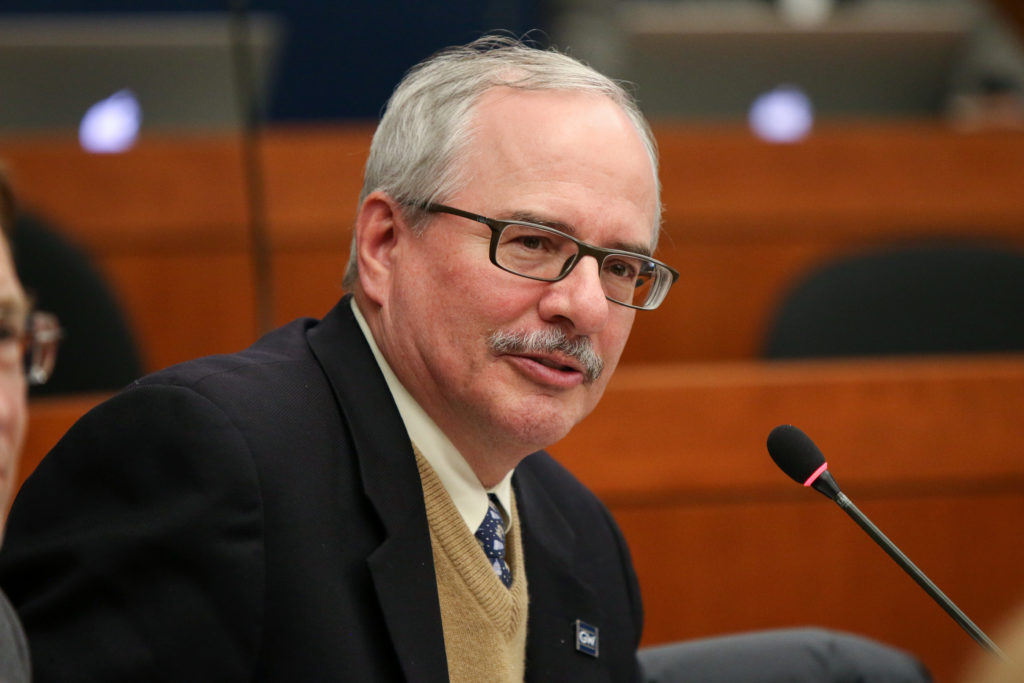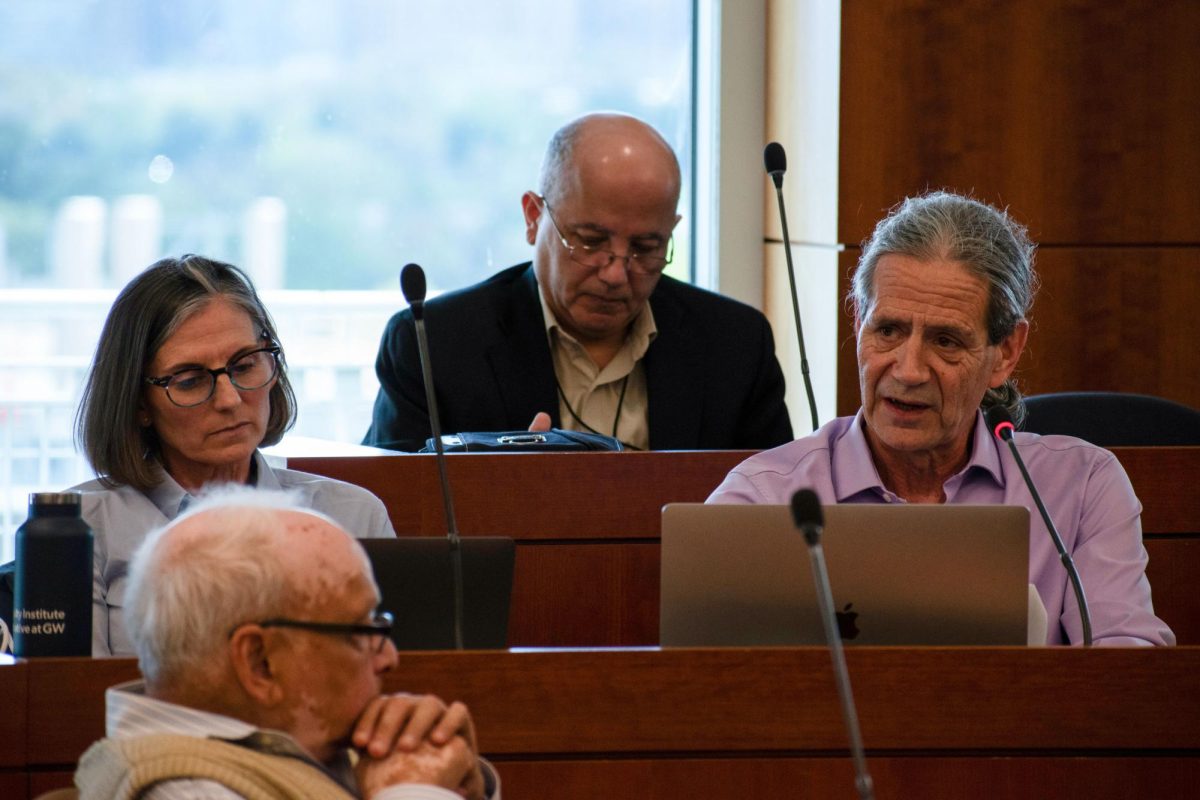As University President Thomas LeBlanc found himself increasingly at odds with faculty while the COVID-19 pandemic progressed, he locked in on a defined messaging strategy – communicate regularly and don’t overpromise.
At each defining moment over the past year, like summer demonstrations fueled by the murder of George Floyd, an insurrection at the U.S. Capitol and extensions of remote learning, the University community’s inboxes have been filled with messages from a regular sender – “President Thomas J. LeBlanc.” As the Board of Trustees works to conduct its standard review of LeBlanc, the University president also faces growing criticism from faculty who have been calling for him to resign since last February.
Among his dozens of public statements, 13 subject lines indicated an “update” – often related to operational planning for Commencement or future semesters – while more than 10 offered support for marginalized groups, including responses to a rise in anti-Asian hate crimes or condemnations of recent police killings of Black Americans.
“I’ve talked to folks in Florida, I’ve talked to folks in California or New York City – I think different parts of the country, different families and frankly, different socioeconomic strata, are experiencing the pandemic differently,” LeBlanc said in a January interview. “We know there has been a disproportionate negative impact on people of color in our community, so we’re all experiencing it a little bit different. I think regular communication from the University unifies, to some extent, our experience.”
LeBlanc has said that as GW prepares to emerge from the pandemic, he intends to continue regular communication to stay engaged with the University community.
“It just reminds me the importance of that even after the pandemic, we need to be continually communicating with our community, even if it’s a message that says things are still going okay or things are not changing that much, but we are keeping an eye on it and we want you to know that,” he said.
Officials’ conservative messaging strategy has brought on angst at times from members of the University community looking for certainty and commitments to in-person operations, including plans for Commencement.
Administrators have consistently said they plan to return to campus in the “fullest extent possible” in the fall but have yet to make a definitive decision. While some other D.C.-area universities have used similar messaging, others have come closer to solidifying plans for the fall, like Georgetown University.
“We anticipate the conditions will be in place this fall to bring our full community back and resume more regular life on our campuses,” Georgetown University President John DeGioia said late last month. “We will begin our gradual return this summer, leading up to a full return of our community for the fall semester.”
Although officials have been wary to commit to a full on-campus return, planning is underway for an in-person semester. GW’s course registration system, Banweb, lists classroom locations for courses this fall, and administrators opened up the on-campus housing application earlier this month.
Officials will also require students, faculty and staff to receive COVID-19 vaccinations before returning to campus this fall, a move expected to enable a more normal semester with loosened restrictions. Students said they are concerned about the requirement since some international students may struggle receiving doses in countries with slower rollouts and a lack of vaccines approved in the United States.
Most remote operations will continue through the spring, including commencement ceremonies that officials said would remain online later this year. District officials announced guidance earlier this month for universities to conduct in-person graduation events, which has led schools like Georgetown, Howard and American universities to host events on their campuses in May.
But at GW, officials have confirmed plans for an entirely virtual commencement ceremony, a mass event typically held on the National Mall but is not currently permitted under the National Parks Services COVID-19 guidelines. The decision has sparked criticism from students on social media.
Administrators have viewed a planned virtual event in May as a placeholder until graduates from both the Class of 2020 and 2021 can gather on the Mall.
“We have heard loud and clear that the community’s top priority is having a university-wide Commencement ceremony on the National Mall, even if it must take place at some point in the future, at a time when it is safe to gather,” LeBlanc, Provost Brian Blake and Dean of the Student Experience Cissy Petty said in a joint message earlier this month. “When it is safe to do so, the University will host in-person celebrations on the National Mall to honor the Class of 2021 and the Class of 2020, with each class enjoying its own, curated celebration.”
Blake has said he views the virtual ceremony as merely a conferral of degrees, while a true Commencement ceremony will not occur until it is safe to do so.
As officials navigated the pandemic, GW found itself in the midst of demonstrations and protests with national attention in the District, like Black Lives Matter protests. LeBlanc sent messages to the GW community following other major events like ongoing D.C. statehood advocacy and the 2020 presidential election.
In May, LeBlanc condemned the police killings of George Floyd, Ahmaud Arbery and Breonna Taylor.
“I cannot begin to fathom the hurt GW’s Black students, faculty and staff may be feeling,” he said. “My heart goes out to all who are suffering and may not feel safe.”
LeBlanc said in a statement last week that the conviction of former Minneapolis police officer Derek Chauvin in the murder of Floyd gives him a “sense of hope,” but more work remains to be done.
“I recognize that some in our community are experiencing racial battle fatigue, trauma, hurt and harm right now,” LeBlanc said. “Please continue to check in on one another and provide space or support to the students, faculty and staff in our community who may need it.”
He also condemned the rioters who stormed the U.S. Capitol in January, calling the incident “deeply disturbing.”
“Like many of you, I watched in horror and dismay as violent protestors stormed the Capitol and tried to prevent the United States Congress from performing its constitutional duty of counting the Electoral College votes from the presidential election,” LeBlanc said in an email to the GW community. “The pictures of members of Congress forced to take shelter under their desks as protestors scaled the walls of the Capitol were almost unimaginable, and those responsible need to be punished to the full extent of the law.”








